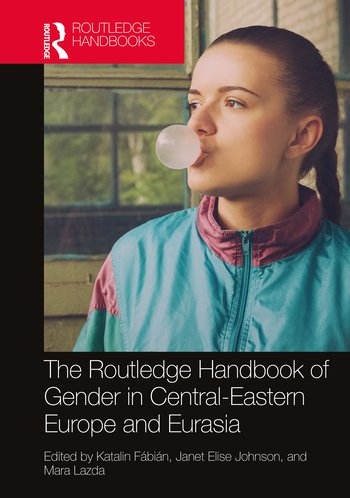
Organised by Andrea Pető and Eszter Varsa (CEU, Gender Studies)

The Routledge International Handbook to Gender in Central-Eastern Europe and Eurasia examines the contemporary historical and political approaches to gender in Central-Eastern Europe and parts of Eurasia (CEE&E) from the 20th through the first two decades of the 21st century. With the collapse of communism starting in the late 1980s, the past three decades brought this large and previously relatively isolated region quickly into extensive contact with the rest of the world. The Handbook asks how political forces have organized gender before, during, and after communism and how individuals and women’s/feminist groups respond. This collection is structured to present the developments in the study of women and gender in CEE&E through the defining debates, highlighting specificity but also the many inviting and challenging connections globally. In 51 chapters, leading scholars examine the region’s highly diverse politics, histories, cultures, ethnicities, and religions, and how these structures intersect with gender alongside class, sexuality, coloniality, and racism.
Gender is always one of the main axes around which politics, economics, and societies are organized, but communist-party regimes in CEE&E explicitly politicized gender by raising and ostensibly solving the “woman question.” As Soviet power collapsed, state-defined gender ideologies transformed, making it even more obvious that not only social norms and economic conditions construct gender, but that gender is a structure of power shaped by distinct historical contexts. As the authors in the Handbook develop, we hold that gender represents systems of difference, privilege, and oppression that affect us all—women, men, and those who do not fit within these binary categories—and is created, not primarily through individual acts of sexism but through political, economic, and social processes, lived and inscribed into laws, informal norms, and practices. The Handbook demonstrates how gender has become politicized and central to the various regimes over the last century and a half in CEE&E.
After a general introduction please join the editors and chapter authors for a digital conversation in zoom break out group on the study of gender in CEE&E and key themes of the book: 1) What are the advantages and challenges of its interdisciplinarity? 2) How useful have the debates--about western intervention, feminism, and the assessment of state socialist policies for promoting gender equality but also about the usefulness of traditional gender analytics--been for furthering this study? 3) How do ethical commitments inform our inquiry, including regarding the integration of race, intersectionality, and postcoloniality? 4) Whether and how it remains useful to consider as a region when it comes to analyzing gender?
Join Zoom Meeting
https://us02web.zoom.us/j/85496835847?pwd=ZllwSHo1OUYxK3hobEo4YXFWaENGQ…
Meeting ID: 854 9683 5847
Passcode: wMNhu2
Katalin Fábián is a Professor of Government and Law at Lafayette College, Easton, PA USA. She wrote Contemporary Women’s Movements in Hungary: Globalization, Democracy, and Gender Equality (2009), and edited Domestic Violence in Postcommunist States: Local Activism, National Policies, and Global Forces (2010), as well as Democratization through Social Activism: Gender and Environmental Issues in Post-Communist Societies, with Ioana Vlad (2015), and Rebellious Parents: Parents’ Movements in Central-Eastern Europe and Russia, with Elżbieta Korolczuk (2017).
Janet Elise Johnson is a Professor of Political Science at Brooklyn College, City University of New York, USA. Her other books include The Gender of Informal Politics (2018), Gender Violence in Russia (2009), and Living Gender after Communism (2007). In the last few years, she has published articles in Slavic Review, Human Rights Review, Journal of Social Policy Studies, Politics & Gender, Perspectives on Politics, Journal of Social Policy, and Aspasia as well as online in The New Yorker, The Washington Post’s Monkey Cage, and The Boston Review. With Mara Lazda, she moderates a workshop on gender and transformation in Europe, formerly at New York University.
Mara Lazda is Associate Professor of History at Bronx Community College, City University of Brooklyn, New York, USA. Her regional focus is on Latvia, with broader research interests on the intersections between gender, nationalism, and transnationalism in historical and contemporary contexts. Her articles have appeared in the Journal of Baltic Studies, the International Journal of Politics, Culture, and Society, and Nationalities Papers. She currently serves as an editor for Aspasia: The International Yearbook of Central, Eastern, and Southeastern European Women's and Gender History.
The editors will be joined by chapter authors, including:
Cynthia Buckley, Dovilė Budrytė, Andrea Chandler, Yulia Gradskova, Agnieszka Graff, Anna Hájková, Karla Tonine Huebner, Anita Kurimay, Alexandra Novitskaya, Andrea Pető, Karen Petrone, Joanna Regulska, Rochelle Goldberg Ruthchild, Ivan Simic, Lisa Sundstrom, Eszter Varsa, Nancy Wingfield, Christine Worobec, and Marita Zitmane.